Delivery workers in court: Why is the determination of labor relations on delivery platforms so changeable?

Text | Water-drinking thief nemesis Lina
Among the many discussions surrounding delivery workers, one issue has always been at the core: legal disputes over delivery workers' labor relations. This issue is related to the law, whether the platform has the responsibility to pay five social insurances and one housing fund, work-related injury insurance, wages and remuneration for the delivery worker, and it is also related to how to identify work-related injuries and compensation when the delivery worker encounters an accident during the delivery process.
Specifically, this article will sort out how the court determines the labor-management relationship between takeaway riders, agency companies and takeaway platforms under the current legal principles and framework in China. Are these reasons reasonable? Going a step further, we try to compare the judgments in other places - this article selects Taiwan and the United Kingdom, which the author is more familiar with, hoping to provide some inspiration for China's judicial practice and the introduction of guiding principles for new platform labor.
1. The relationship between the platform and the rider
A representative of Meituan once publicly stated that "nearly 10 million riders are outsourced employees and have no labor relationship with Meituan" when receiving a report from Beijing Satellite TV, which immediately triggered a lot of public opinion discussions. However, this is not the first time that a food delivery platform has made such an explicit or implied statement, and it will never be the last. As the platform economy matures and grows in China, more and more people are engaged in new jobs such as food delivery riders and online car-hailing. When these workers try to take up the weapon of law to protect their legitimate rights and interests in labor , but was stunned to find that the existing legal framework was not enough to protect itself. On the other hand, with the progress of legal judgments, the platform is also "evolving" step by step, making the road of riders' rights protection more difficult.
Before discussing the specific judgment, let us briefly introduce the employment mode of domestic and foreign delivery staff. Takeaways are usually divided into two types: special delivery and crowdsourcing. Special delivery riders (accounting for 60%) have daily delivery task requirements and need to attend company meetings and directly accept the management of the company and site. Generally speaking, labor relations are guaranteed to some extent. Crowdsourced delivery workers have a certain degree of freedom. They have no direct agency company, no fixed commute time, and a slightly higher degree of freedom. They can choose whether to accept orders. . Generally speaking, crowdsourcing workers are unlikely to be identified as labor relations, and the court's identification principles are not clear, and they may be identified as labor relations or contracting relations.
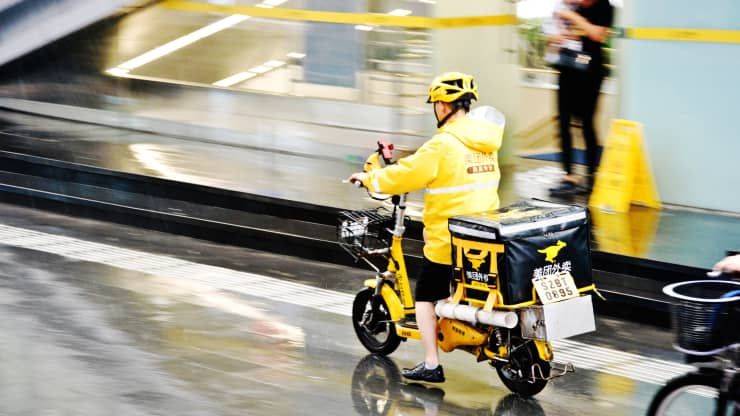
Beijing Yilian gave a detailed description in its 2020 report on labor rights and interests of employees in new formats :
"With the development of the distribution market from competition to monopoly, the employment mode of food delivery workers has also changed from platform employment to outsourcing, crowdsourcing, etc. During this process, the labor law umbrella of food delivery workers has been gradually Dissolving. If the crowdsourcing model disintegrates the labor relationship of some food delivery workers, another model that has emerged now strips the coat of labor law from all food delivery workers, and the special delivery workers are no exception. It is a new mode of flexible employment on the Internet. As we mentioned earlier, the employment relationship of the takeaway courier is a hierarchical relationship of "platform - agent • • • agent - site - takeaway courier", in this relationship, the takeaway courier and the agency company Or there is a labor relationship with the labor dispatch company that cooperates with the agent. With the emergence of the flexible employment model on the Internet, this labor relationship has also been broken. Some flexible employment management platform companies, such as "Haohuo" and "Book a Job", have developed solutions for agency companies. The flexible employment management platform company first helps takeaway delivery workers to register as "individual industrial and commercial households", and the flexible employment management platform The company then signed a contracting agreement and a contracting agreement with the agency company and the special delivery courier respectively. In this way, the agency company will contract the take-out delivery business managed by itself to the flexible employment platform company, and the flexible employment platform company will then contract the delivery business to the special delivery staff who are already "individual industrial and commercial households". As a result, a legal relationship of subcontracting layers of "distribution platform - agent - flexible employment management platform - takeaway delivery staff" was formed. In fact, many food delivery couriers have mentioned that the company requires them to register small programs or APPs developed by the flexible employment platform on the grounds of paying wages. They do not know the legal significance of registration and the content of the contract, nor do they Be aware of its legal consequences. In fact, the work content and work process of the food delivery couriers have not changed, and they are still subject to the labor management of the agents and have subordination. "
2. Review of Chinese judicial precedents
By searching the China Judgment Documents website, we found that most of the cases related to takeaway include: motor vehicle traffic accident liability disputes; right to life, right to health, right to body disputes; labor disputes; labor relations confirmation disputes, etc.
Taking Meituan Takeaway as an example, the author searched for the keywords “labor relations”, “Meituan”, and “Sankuai” on the Chinese Judgment Documents Online. The website has records involving riders and Sankuai (the parent company of Meituan.com). , hereinafter referred to as Sankuai) labor relations precedents can be traced back to the civil judgment of the People's Court of Shuangyang District, Changchun City ( Case No. (2016) Ji 0112 Min Chu No. 1348 ). In this case, the deliveryman injured the community security guard who blocked his entry during the delivery process. The security guard filed a lawsuit, demanding compensation from the defendant deliveryman and Beijing Sankuai Company. In this case, the court did not explain the reasons for the judgment in detail, but made it clear that "the plaintiff did not provide evidence to the court during the trial to prove that the defendant XX was an employee of Beijing Sankuai Technology Co., Ltd., so the plaintiff's claim that the two defendants should bear joint and several liability, this The hospital will not support it.” That is to deny the labor, labor and employment relationship between Sankuai and the rider.
In the precedents we found, Sankuai Company was excluded from the labor relationship with the rider without exception, and most of the disputed points were whether the rider had a labor relationship with the agency company .
2.1 Not necessarily! The randomness of the identification of the labor relationship between the rider and the agency company
After investigating a large number of cases, we found that the legal determination of the labor relationship between takeaway riders and agency companies in existing judicial practices is highly subjective and depends on the court that issued the judgment and the time of the judgment. Taking a Qingdao XX joint venture company we inquired as an example, in its case judgments related to Meituan takeaway riders (6 cases in total, 1 case was withdrawn):
- 2020.09 In the judgment of the Zibo Intermediate People's Court ((2020) Lu 03 Min Zhong No. 2895), it was ruled that it was a contractual relationship, and the judgment of the Huantai County People's Court of the first instance was overturned with a labor relationship ( (2020) Lu 0321 Min Chu No. 793 ).
- In the judgment of Qingdao Intermediate People's Court ( (2020) Lu 02 Min Zhong No. 1324 ) in 2020.03, the first-instance judgment was upheld, that is, there was no labor relationship between the rider and XX Co., Ltd.
- But in 2020.08, also in the Qingdao Intermediate People's Court (( 2020) Lu 02 Min Zhong No. 8806 ), the court upheld the first-instance judgment and determined that the relationship between the rider and the XX company was an employment relationship, not a contracting relationship.
- In the case in January 2021 ( (2021) Lu 02 Min Zhong No. 315 ), the Qingdao Intermediate People's Court also upheld the first-instance judgment, ruling that there was a labor relationship between the rider and the company.
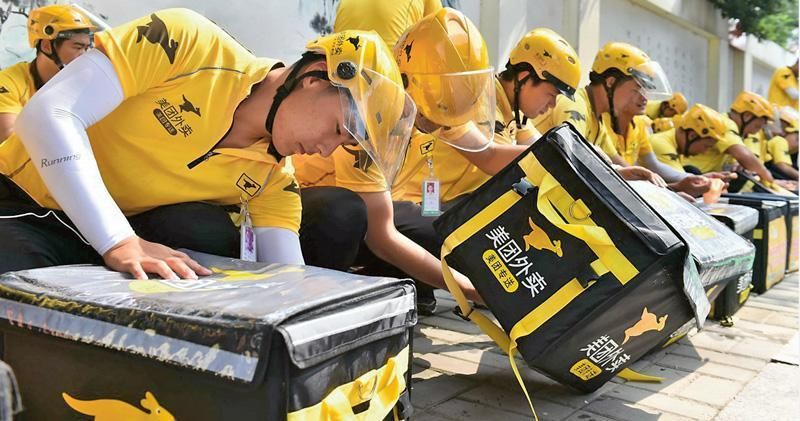
It can be seen that, for the same agency company, the court judgment in the same region has progressed—that is, the identification of the absence of an employment relationship to the existence of an employment relationship (employment relationship includes labor and labor relationship here), however, In different regions, there may not be progress over time. In August 2020, the Qingdao Intermediate People's Court had determined that there was a labor relationship between the rider and the agency company, but in September, the Zibo Intermediate People's Court still did not recognize the labor relationship. Instead, the judgment is a contractual relationship. What is even more surprising is that when the riders provide similar proof of employment relationship, courts in different regions will give different determinations, that is, they will give completely different judgments on whether the riders are subordinated to the agency company in terms of economy and personality. .
Since the main purpose of this article is to discuss the relationship between takeaway riders and the platform, the following mainly focuses on the reasons for determining that there is an employment relationship between the rider and the agency company in court cases, and the reasons for determining that there is no employment relationship between the rider and the platform. discuss.
2.2 Rider-dealer company relationship – not necessarily!
Let's mainly take a look at how the court determines the employment relationship between the rider and the agency company.
First of all, the most controversial point is whether the rider and the agency company are employment (labor) or labor relations: in most cases, the relationship between the rider and the agency company will be identified as an employment (labor) relationship, neither Labor relationship is not a contract relationship.
As shown in Case 1, what was identified as a labor relationship in the first instance was changed to an employment (labor service) relationship by the agency company through appeal.
Case 1: ( Case No. (2020) Lu 07 Min Zhong No. 5233 )
According to the schedule of labor costs related to Liu Kunpeng, he is a rider with a registered ID number of 7280553. Based on the existing evidence in this case, it can be determined that Liu Kunpeng provides services for customers based on online food ordering and delivery. When he provides the service, he is subject to the assessment and constraints of the management system of Hanhai Network Company, and the remuneration is issued by the company. Therefore, the relationship between the two is actually established. Employment relationship. The first-instance judgment found that the relationship between the two was a labor relationship, which was wrong, and this court corrected it. Article 9 of the Provisions of the Supreme People's Court on Several Issues Concerning the Application of Law in the Trial of Personal Injury Compensation Cases stipulates, "If an employee causes injury to others in his employment activities, the employer shall be liable for compensation; should be jointly and severally liable for compensation with the employer. If the employer is jointly and severally liable for compensation, it can claim compensation from the employee." In this case, Liu Kunpeng suffered damage to Yang Zhiqiang due to a traffic accident involved in the delivery of labor services, and his employer, Hanhai Networks, should be liable for compensation. responsibility. Liu Kunpeng assumed full responsibility for the traffic accident, stating that as an employee, he had gross negligence for the damage to Yang Zhiqiang (the victim of the traffic accident) caused by the traffic accident, so he should be jointly and severally liable for compensation with Hanhai Network Company. After Hanhai Networks assumes the liability for compensation, it can claim compensation from Liu Kunpeng in accordance with the law.
In Case 2, the court explained in detail why the takeaway rider was identified as having an employment relationship with the agency company rather than a contracting relationship (the contracting relationship is a relationship in which both parties are legally recognized as equal, and Party B only provides products to Party A).
Case 2: ( Case No. (2020) E 01 Min Zhong No. 1772 )
The court held that food delivery riders, as an emerging professional group, should bring their own electric vehicles, food delivery boxes, mobile phones, clothing with relevant platform logos and other equipment, tools, and labor insurance items to complete the delivery of orders on the food delivery platform. A series of operational processes such as merchants taking orders and delivering to users. The delivery behavior of takeaway riders is essentially to realize the displacement of goods or services within a certain time and space through their own services under the existing technical conditions. It is the delivery service itself, not the work product. No matter what kind of written contract Wuhan Tianyu Lingdong Company signed with Wang Zhengzheng, it could not cover up the fact that it was essentially an employment relationship with Wang Zhengzheng.
In another precedent (Case 3: Case No. (2019) Su 05 Min Zhong No. 2678 ), the court explained the reasons for determining the employment (labor) relationship:
Fujiang Company manages and deploys the riders who deliver meals. Shi Leiming needs to dress uniformly according to the requirements of Fujiang Company and use a unified takeout box during the meal delivery process. Fujiang Company pays Shi Leiming, and Shi Leiming's work content is long-term and stable. Therefore, the relationship between Fujiang Company and Shi Leiming is in line with the legal characteristics of employment relationship, and the relationship between Fujiang Company and Shi Leiming is an employment relationship.
Case 4 ( (2020) Yu 05 Min Zhong No. 7685 ) clearly pointed out that the rider is a crowd-sourced rider, so it is a labor service rather than a labor relationship.
It can be seen that the determination of the employment (labor service) relationship between the agency company and the rider mainly depends on: 1. The uniform logo and dress of the takeaway company (Meituan); 2. Subject to company management, assessment, and constraints; 3. Delivery of labor Remuneration; 4. Long-term and stable work. That is, "personality subordination", "economic subordination" and "organization subordination" emphasized in traditional labor relations . It is worth noting that although the current trend is that most courts will judge the relationship between the rider and the agency company as an employment (labor) relationship, some courts may also judge a contractual relationship, or labor relationship, showing the current law. Inapplicability of clauses and subjectivity of court decisions.
2.3 Rider and Platform (Three Fast Company) –– definitely not!
Next, let's take a look at how the court denied the labor relationship between Sankuai and the rider .
In the earliest case 5 of the motor vehicle traffic accident liability dispute ( Case No. (2016) Jing 0102 Min Chu No. 32953 ), the court ruled that the rider had no direct labor relationship with Sankuai Company : "Sankuai Online has no direct labor relationship with Sankuai Company. The cooperation and subcontracting business model between Yongsheng Liye has no direct labor relationship with Gaofeng, and the traffic accident dispute is not directly related to Meituan’s services, so Sankuai Online does not need to bear the responsibility for the accident.” But this case did not Explain in detail the reasons for denying the labor relationship between Sankuai and the rider.
In subsequent cases, we can find more detailed explanations. For example, in Case 6 (2017) Jing 0105 Min Chu No. 67378 , the court stated that "Beijing Sankuai is only an online platform operator, providing a trading platform for merchants and users". In Case 7 (2018) Su 05 Min Zhong No. 990 , the court determined that Beijing Sankuai Technology Co., Ltd. "is an online platform operator, a website that provides a trading platform for merchants and users, and does not participate in actual business activities, nor is it Transaction subject", so there is no labor relationship with the rider.
In cases beyond 2020, we can see more explanations. For example, Case 8 (2020) Hu 0112 Min Chu No. 39258 believed that "Shanghai Sankuai Company is the operator of the "Meituan Crowdsourcing" platform, and only provides information intermediary services, and does not manage crowdsourcing personnel, so it cannot be determined A labor, labor service, and employment relationship is formed between Shanghai Sankuai Company and the crowdsourcers.” In Case 9 (2020) Su 0102 Min Chu No. 7833, Sankuai Company argued that "it is not responsible for the daily management and salary payment of (riders), and Sankuai Company has no labor, labor or labor dispatch relationship with (riders)".
In 2020, the Suzhou Court heard a labor dispute case (Case 10: Case No. (2020) Su 05 Min Zhong No. 10756 ). Since this case went through the first instance and the second instance, and the focus of the dispute was the determination of the labor relationship, the court provided clear reasons for the determination/denial of the labor relationship in both trials. In the first instance, the plaintiff (rider) requested to clarify the co-existence of labor relations with Sankuai Company and the agency company, which was rejected by the court. The first-instance judgment found that "it can only prove that Gao Zhiqiang is a rider of "Meituan Takeaway" and is engaged in the distribution business, but it cannot prove that Gao Zhiqiang needs to accept the unified management and supervision of Sankuai Company or Qiandaibao Company in the distribution business, nor can it prove that Gao Zhiqiang is engaged in the distribution business. Sankuai Company or Qiandaibao Company issued labor remuneration, and the two parties did not meet the requirements for establishing a labor relationship .
Subsequently, the rider filed a second-instance appeal, requesting to clarify that he had a labor relationship with Sankuai Company. The court held: "The determination of labor relations should be based on whether the laborer actually accepts the management, command or supervision of the employer, whether the labor provided by the laborer is an integral part of the employer's business, whether the employer provides the laborer with basic labor conditions, and The payment of remuneration to laborers and other factors are comprehensively identified. In this case, the existing evidence provided by (the rider) can only prove that he is a “Meituan Takeaway” rider. Because Sankuai is only an online platform operator, providing transactions for merchants and users The online service platform, (Rider) has not been able to provide evidence to prove that the labor that provides food delivery is assigned by Sankuai Company, and accepts the command and supervision of Sankuai Company. The relationship between the rights and obligations of dominating and being dominated is subordinate in terms of identity, and there is no evidence to prove that Sankuai Company paid labor remuneration to him, so the relationship between him and Sankuai Company does not meet the legal characteristics of establishing labor relations , (rider ) demanded to confirm the existence of a labor relationship with Sankuai Company, which lacked factual and legal basis, and was not supported by this court.
From the above precedents, we can see that the court’s denial of the employment relationship between Sankuai Company and riders mainly depends on: (1) Sankuai Company is a platform operator and an information service provider; (2) Sankuai Company is a platform operator and an information service provider; (2) Sankuai Company No unified management and supervision of the riders; (3) The labor of the riders is not assigned by Sankuai Company, and is not a business composition of Sankuai Company; (4) Sankuai Company does not pay the riders labor remuneration nor provide basic labor conditions. .
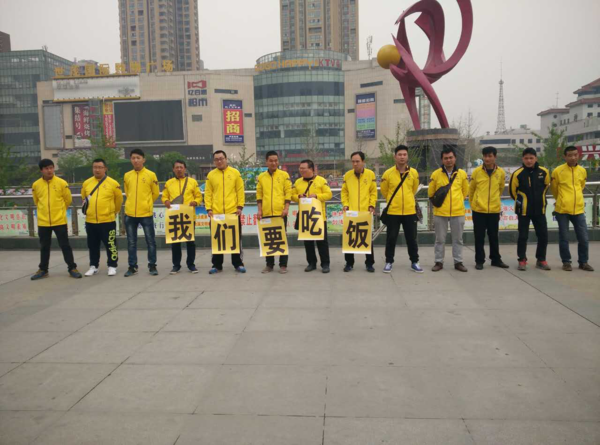
3. Solutions elsewhere
Perhaps for readers concerned with the rider's plight, these verdicts may be expected. However, comparing the precedents in other regions, we can see that the judicial systems in different regions will have different reactions to the new trend of odd jobs. This comparison helps us to open up some new discussions. Here we first refer to the cases of Taiwan and the United Kingdom for discussion.
3.1 Labor Relations Judicial of Delivery Workers in Taiwan
Food delivery platforms have entered the Taiwan market as early as 2012, until two car accidents involving delivery workers in October 2019. However, the platform involved emphasized that there was only a “contract relationship” between the platform and the delivery workers, and the delivery workers did not have any social security, which caused the incident. Widespread discussion in the society, and the government's active intervention. After the labor problems of the gig platform surfaced, Taiwan's labor department conducted labor inspections on the two platforms involved, Uber eats and Foodpanda, and determined that there was an "employment relationship" between the platforms and the delivery workers, and punished the platforms according to relevant labor laws. Employment insurance was not declared for delivery workers. However, the identification of this employment relationship only belongs to the parties, and does not directly define the labor relationship between all delivery workers and the platform.
How does the labor department in Taiwan confirm that the relationship between the party and the platform is an employment relationship, not a contracting relationship as claimed by the platform? They pointed out that the two platforms have designated working hours for delivery staff, designated to wear branded uniforms, and have to report within 24 hours if they fail to take orders. " . After the incident, Taiwan's labor department took the initiative to investigate the platform industry, and soon in November of the same year, it launched the " Guidelines for the Recognition of Labor Contracts " for the dispute with the platform's "false contract, real employment", which is regarded as whether the platform and the delivery person constitute employment. The legal definition of relationship has a relatively clear position.
The legal basis for this principle is to refer to the 2016 interpretation of the judge on insurance salesmen ( Interpretation No. 740 [Whether insurance salesmen solicit insurance labor contracts is a labor contract case] ), pointing out that "courts or administrative agencies will never Constrained by the form or name of the contract, it is still possible to determine whether it is a labor contract based on the facts of the individual case and the overall contract content, according to the level of attributes.” The so-called subordination criterion is to judge one by one according to "personality subordination", "economic subordination" and "organization subordination", and then make a comprehensive judgment. Separately, "personality subordination" means that the working time and place of the laborer are controlled by the company, and the employee cannot refuse the work assigned by the employer, must abide by the service discipline and punishment, and so on. Indicators of "economic subordination" include "laborers will be remunerated regardless of whether their work is successful or not", and "remuneration can only be obtained according to the standards set by the company or unilaterally changed", etc. "Organizational subordination" means that laborers must divide labor with others to complete their work, which means that laborers are part of the business organization of the company, subordinate to their superiors, and so on.
In order to facilitate employers and laborers to determine the subordination, they provide a total of 25 items "Labor Contract Subordination Judgment Checklist". Although it does not specifically target the platform, it can be seen from some texts that special consideration is given to the labor status of the delivery riders. For example, under the judgment of "personality subordination", one of the checks is "the labor provider Attendance during working hours, if you do not ask for leave, you will be punished or unfavorable treatment (including stopping dispatching orders or changing work areas arbitrarily)” , which is a response to the previous dispute that riders “rejected orders” and then were automatically adjusted by the platform’s algorithm. .
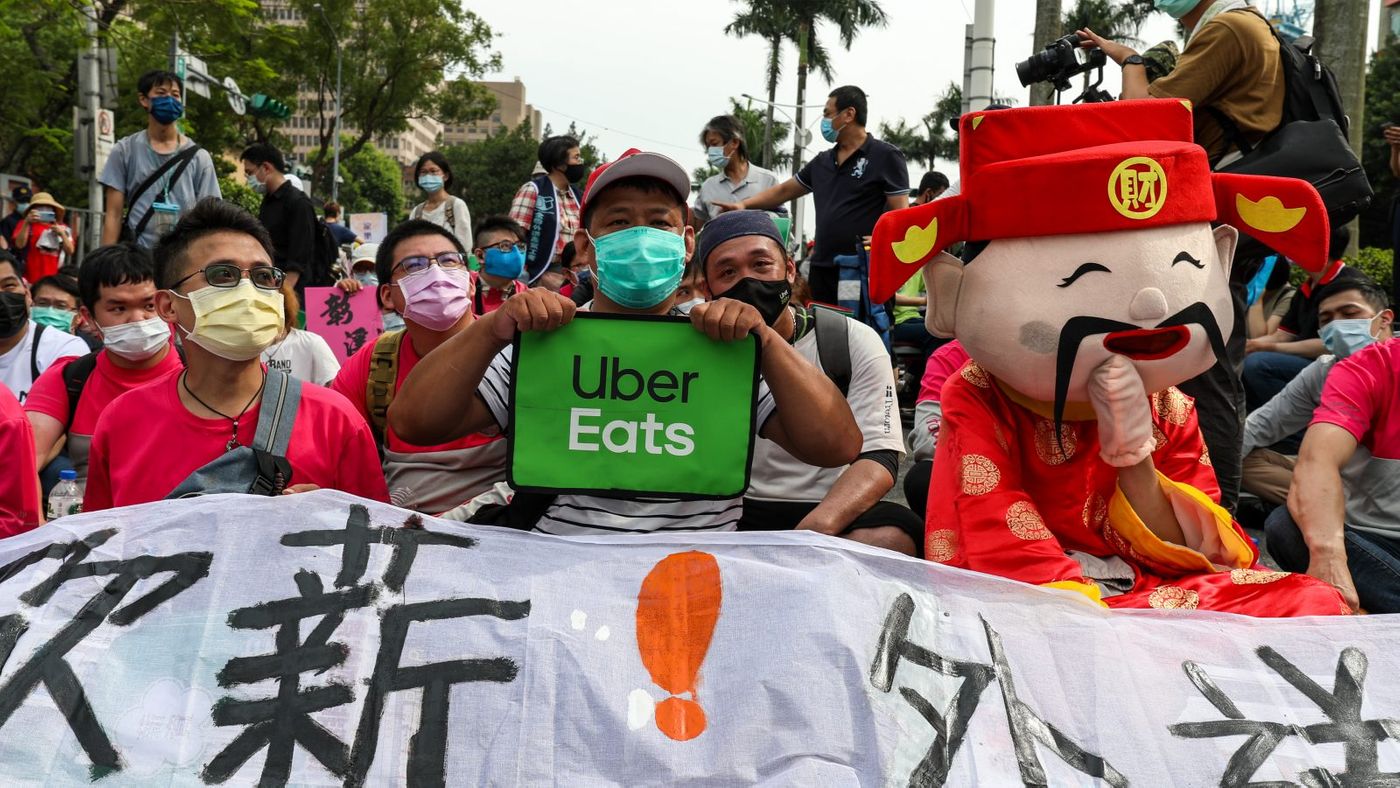
So how does this change actually affect the legal rights of takeaways? As far as we searched, since the publication of the "Guiding Principles for the Determination of Labor Contracts", only 9 judgments have mentioned this principle, and only one of them ( Taipei High Administrative Court ruling No. 54 in 109 ) is related to takeaway platforms. It does not seem to have caused a large number of lawsuits (but in fact, if you search for "delivery workers" as the keyword, there are not many cases about labor relationship determination). The only case is actually an accidental extension of the above-mentioned Uber eats delivery worker. In this case, before Uber eats applied to the court to stop the execution, the labor department imposed a fine on it for not reporting employment insurance for delivery workers, which was rejected by the court.
Just two months after the application was rejected, Taiwan's Executive Yuan formally rejected Uber eats' petition against fines (the Executive Yuan's petition decision Shu Yuan Tai Fu Zi No. 1090186142), on the grounds that in the specific labor process of the delivery staff, it can be Judgment belongs to the platform. We haven't seen the result of Uber eats' appeal, and from March 2020 to March 2021, Taiwan's labor department will punish Uber eats for the same issue every month, regarding Taiwan's food delivery platform and food delivery The legal disputes over the labor relations of employees are currently stagnant at this stage.
Based on the above, the Taiwan authorities are relatively proactive in intervening in labor disputes between delivery workers and platforms. Although we have not seen many examples of delivery workers successfully defending their rights through the " Guidelines for Determination of Labor Contracts ", it can be seen from the existing judgments, the appeals against the platform, and the continuous punishment of the platform that the Taiwan authorities protect the riders. It is relatively firm for the time being.
It must be pointed out, however, that this firmness is a negative firmness . why? As mentioned above, the “employment relationship” of a delivery person is determined independently on a case-by-case basis. On the one hand, it is easy for the platform to try to avoid the employment relationship by revising the contract with the delivery person. For example, Foodpanda originally forced the delivery person to wear a uniform. And use their incubators, otherwise each order will be fined 10 yuan, and later changed to if the takeaways wear uniforms and use the company's incubators, they will be rewarded with 10 yuan for advertising fees (recently changed to 5 yuan for advertising fees, consumers Feedback fee of 5 yuan) - the same income, the same labor conditions, the subordination of the deliveryman suddenly "reduced". More importantly, simply identifying the employment relationship has no way to deal with the platform's usual unilateral adjustment of the unit price calculation method - in fact, the unit price reduction - this is from the fact that most of the takeaway strikes in recent years are caused by the platform's adjustment of the unit price. Know. That is to say, Taiwan still lacks a law specifically dealing with the employment of platforms to clearly define the legal responsibilities of platforms and to ensure an equal dispute resolution mechanism between a delivery worker and a platform.
3.2 Labour Relations Justice for Uber Drivers in the UK
In February this year, the UK Supreme Court rejected Uber’s appeal and finally ruled that Uber drivers are workers and not self-employed. The judgment inspired people around the world who are concerned about gig workers, and also means that Uber drivers legally enjoy some labor guarantees, such as minimum wages, Paid time off, etc. This 6-year judicial battle has gone through 4 lawsuits and 3 appeals by Uber. Although there are certain differences between Uber drivers and riders, they act as a platform at the same time, and the legal defenses and points of controversy they propose can be discussed together. In view of the relatively large number of reports on this case, we will only mention some key points here.
The legal dispute in this case is that the definition of "worker" in UK law includes "where by an individual undertakes to perform work or services for the other party", so Uber drivers are under contract Serving Uber in the UK; or, in Uber's position, Uber is just an intermediary and an Uber driver is a passenger.
In this final judgment ( Uber BV and others v Aslam and others ), the court did not overturn the previous employment tribunal's initial finding of fact that Uber drivers: (1) Uber determines the compensation paid to Uber drivers and that the driver has no discretion. ; (2) The terms of the driver's contract are dictated; (3) While drivers have the freedom to choose when and where to go to work, once they are logged into the Uber app, their choice of ordering is limited by Uber; ( 4) Uber has many degrees of control over the services provided by the driver; (5) Uber limits the communication between passengers and drivers to a minimum, and actively prevents drivers and passengers from establishing a relationship beyond a certain car.
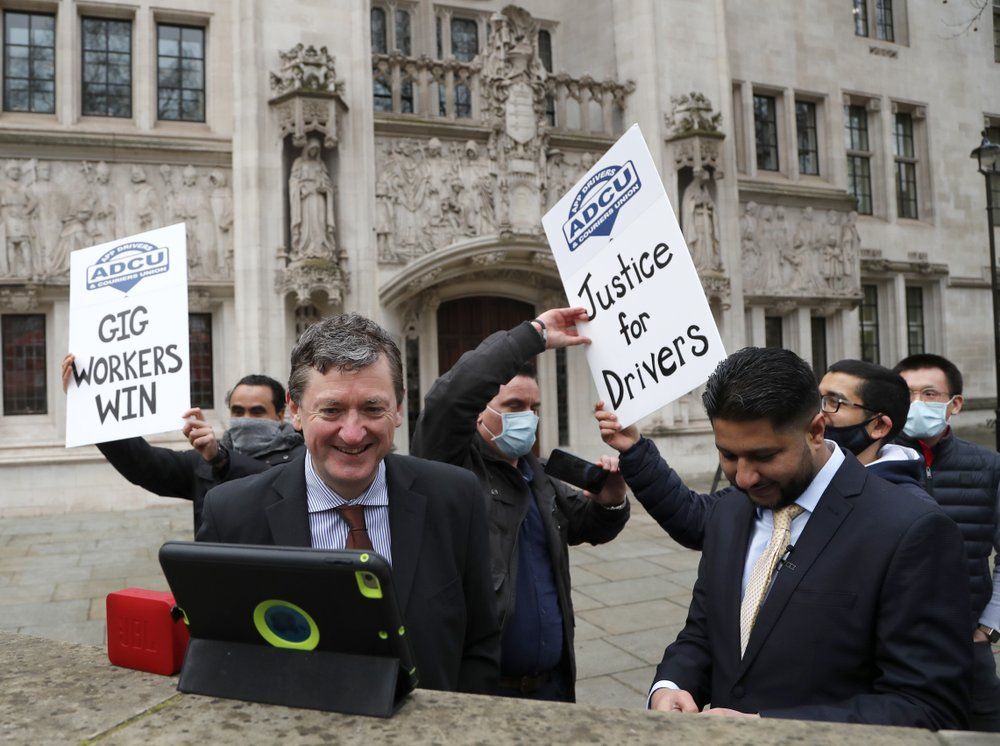
4. Three questions about the judgment of the Chinese judiciary
Through the review and comparison of the above cases, most of the affairs agencies asked the Chinese judicial authorities three times about the rider-employment relationship in the mainland:
First, why is the local judicial decision so arbitrary in the judgment of the rider's employment relationship? Courts in different regions can come up with completely opposite decisions at different times. What's more, the riders have provided similar evidence, but in different district courts, it has been the reason for the opposite verdict. However, in the case documents mentioned by the author, the court did not give a clear explanation of the verdict and the reasons. On the one hand, this randomness is brought about by platform capital: providing contracts, requiring riders to bring their own labor tools (such as motorcycles, mobile phones, etc.), subdividing wage calculations, and using "more work, more pay" to cover the platform's perception of wages horizontal arbitrariness. All of the above are challenging the original "Labor Law" and other laws, resulting in the lack of updating of legal guidance, local courts make their own judgments according to their own interpretations, resulting in different courts' different judgments on similar cases, as for riders, etc. It is obviously unfair for platform workers to prescribe expired medicines. On the other hand, even if recently issued, such as the "Guiding Opinions on Promoting the Standardized and Healthy Development of the Platform Economy" and the Human Resources and Social Security Bureau's proposal to revise the "Regulations on Work Injury Insurance", it seems that there are plans to protect the platform workers, but at least for now Come on, it's all just minor repairs, and it hasn't really touched the core - whether there is a labor relationship between the platform's labor and the platform. And this problem is not dealt with uniformly one day, and platform capital will always have thousands of new ways to avoid responsibility and control riders to work for them at the least cost.
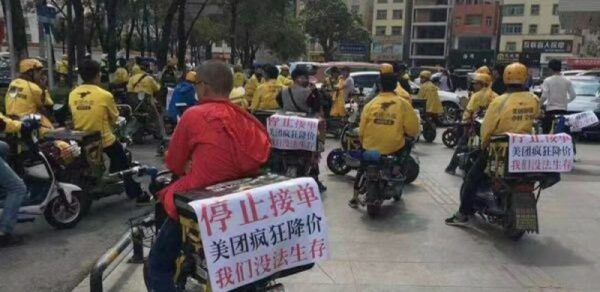
Second, because the platform’s special market and business operation methods in the mainland are different from those in other regions: in the judicial judgment in the mainland, the agency company bears most of the responsibility of the employer (labor or labor), but can the platform be exempted from this responsibility? Regarding the platform's personal management of riders and the control of riders' single income, there have been many discussions in the academic circles and the media before, and most of them have also published many articles to participate in the discussion. Why is it still denied in the Chinese judicial judgment? How much of this is out of consideration for platform economic support? How much of the consideration is given to the rights and interests of workers? Between platform capital and laborers, did the court choose platform capital? Further, focusing the judgment of labor-management relations between riders and agents, rather than between riders and platforms, to what extent does it weaken the bargaining power and resistance of riders (and consumers) to the platform?
Third, in the face of the increasingly controversial platform labor and gig economy, should the state establish a special law to deal with the new platform labor relations? Even if no special law is feasible, can we put forward legally effective guiding principles and judicial interpretations for the identification of labor relations on the basis of existing laws, such as the methods of the United Kingdom and Taiwan, to ensure that riders can receive equal rights in different regional courts? Rights Protection?
With the increasingly tense labor relations on the platform, it is urgent to think about and respond to these issues.
Like my work? Don't forget to support and clap, let me know that you are with me on the road of creation. Keep this enthusiasm together!

- Author
- More